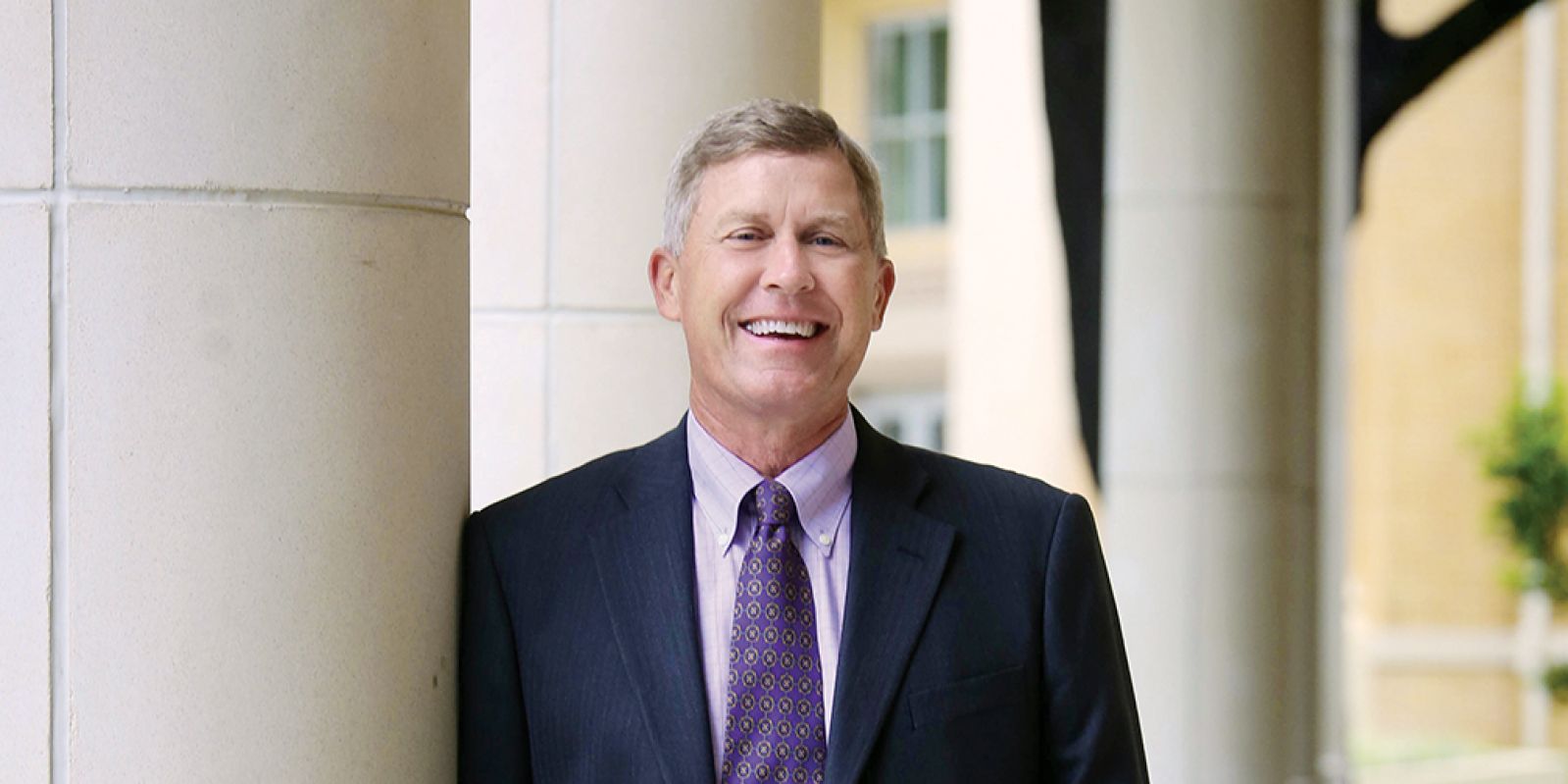
Stuart D. Flynn, M.D., Dean of Fort Worth’s New Medical School
TCU Magazine Editor Norma Martin spoke with Flynn about the evolution of medical school education and the opportunity to develop an innovative M.D. school in the 21st century.
In July 2015, TCU and the University of North Texas Health Science Center announced their intent to create a new school in Fort Worth, offering the doctor of medicine degree. In mid-March, the two universities appointed Dr. Stuart D. Flynn as the school’s founding dean. Before becoming dean of the University of Arizona College of Medicine-Phoenix in 2008, Flynn was a professor of pathology and surgery at the Yale University School of Medicine.
[Editor’s Note: The conversation has been condensed and edited for length and clarity.]
During your on-campus presentation in February, you talked about how medical education should be “all about the patient.” How do you envision that the new school will transform this fundamental philosophy into applied practice?
Medical schools have long trained physicians to learn a lot about medicine to make diagnoses. They are trained to recognize and treat diseases. All of this knowledge is important, but what is equally important is developing the effective interpersonal communication skills they will need to talk with their patients. We are all consumers of health care. If you’re going to see a physician, you want someone who can talk with you and who can relate to you about the things that matter in your life. We want to train physicians to think about their patients holistically. We want them to think about the patient’s whole experience.
You were the founding dean of the University of Arizona College of Medicine-Phoenix. What did you learn during that leadership experience that you hope to embrace while developing the new doctor of medicine school in Fort Worth?
What I hope will resonate quickly is that I have a collaborative mindset. Health care systems must collaborate to educate future physicians. If there is collaboration among education, research and providers, the outcomes are greater. Medical school is not about the physician. Patients are the central focus, and everything revolves around them. If we’re all aligned around the patient, then we can deliver health care together. That’s a beautiful thing.
You are a pathologist, but you are not like the pathologists on TV shows, such as Quincy, M.E. or Rosewood?
I’ve done my share of autopsies, but I’m a diagnostic and molecular pathologist. I work closely with surgeons. I make sure they have accurate and appropriate pathological diagnoses.
Why did you decide to become a doctor? Does that reason still drive you today?
 I grew up in upper Michigan. I saw doctors taking care of people in the underserved area where I lived. I was good in science, and I saw medicine as a profession where you could give back. As a medical educator, I have the luxury of having an impact on hundreds, if not thousands, of people. It’s just not me as an individual giving back, but in training physicians who are giving back, I’m helping scores and scores of people.
I grew up in upper Michigan. I saw doctors taking care of people in the underserved area where I lived. I was good in science, and I saw medicine as a profession where you could give back. As a medical educator, I have the luxury of having an impact on hundreds, if not thousands, of people. It’s just not me as an individual giving back, but in training physicians who are giving back, I’m helping scores and scores of people.
TCU embraces the teacher-scholar model of educating students, and all professors teach classes. In Phoenix, you taught classes. Do you plan to teach classes at the new school?
My father was an English professor, and I think of my profession as being a teacher. It has been that way in the beginning, and it will be that way in the end. I carried a heavy teaching load in Phoenix, and I loved it and want to continue teaching in Fort Worth. I teach gross anatomy, preclinical pathology and surgery.
What excites you the most about medical education at this point in time?
When you teach, you’re really doing something for your community, for society. This is a really exciting time for medical education because health care is going to change tremendously. We have to be visionary. We have to project where health care is going in the next 10 to 15 years. One element is technology. Patients can look up anything they want on the Internet. It’s our job to help guide them in that process and not be dismissive. It’s not good enough to identify the health risk and to make the diagnosis. Physicians must be able to explain evidence-based research to their patients and know if the science is solid. They must know what new and innovative personal health technologies are out there and how they can be used to reach beneficial outcomes for their patients. It’s the challenge and the beauty of training the next generation of physicians.
TCU and UNT Health Science Center have been collaborating on several interdisciplinary projects and programs in the last three years. What is attractive or beneficial to you, as founding dean of a new school, about these established partnerships?
 These established, collaborative partnerships are maturing beautifully and that’s just a critical element in planning a new school. Everyone is familiar with each other, and so it is up to us to build on these relationships and expand them to serve the community. Health care delivery is not a solitary endeavor and health care education cannot have walls either. The reality is physicians, nurses, pharmacists and so on, they all work symbiotically, and they should learn to work as a team from the beginning. It’s not a competition; there’s a patient at the center of it all.
These established, collaborative partnerships are maturing beautifully and that’s just a critical element in planning a new school. Everyone is familiar with each other, and so it is up to us to build on these relationships and expand them to serve the community. Health care delivery is not a solitary endeavor and health care education cannot have walls either. The reality is physicians, nurses, pharmacists and so on, they all work symbiotically, and they should learn to work as a team from the beginning. It’s not a competition; there’s a patient at the center of it all.
You talked about the rigidity of traditional medical school curricula. How do you envision that the new school will loosen this kind of old-school inflexibility to blend the four elements – education, research, clinical delivery and community service – that you addressed in your February presentation?
The four pillars are not introduced sequentially; they are melded into everything we teach from day one. Most new students want to study medicine because they are empathetic and want to help people. But studies have shown that the empathy starts to dissipate the further students get into medical school. The question becomes how to mitigate that outcome. The answer: Get students engaged with patients early in their training, instead of waiting until the end as many medical schools do now.
The medical students are far more connected if they are engaged with patients all four years of their training. For example, medical students learn a lot about the science of diabetes and its affect on the human body. If they are working with a patient who has diabetes as they are acquiring this knowledge, they will see first-hand how a husband’s diabetes is affecting the wife and the children. It’s an opportunity for the medical student to see in a holistic manner the impact that disease has on an entire family. It’s a blend of the pillars of education, research, clinical delivery and community service.
What do you anticipate as your principal challenges in developing a new doctor of medicine school in Fort Worth?
The main thing will be to work out all the complexities. You have two universities. You have two schools of medicine. But the Fort Worth community and the health care providers genuinely want the new school and that authenticity will go a long way. [Editor’s Note: The Texas College of Osteopathic Medicine, the state’s only D.O. program, is at UNT Health Science Center.]

Your comments are welcome
Comments
Related reading:
Campus News: Alma Matters, Research + Discovery
Concussion Management and College Football
Could fish oil alleviate the effects of head trauma? TCU researchers work with the football program to investigate the neurological protections of omega-3 fatty acids.
Features
Trauma care
Pre-Health Professions Institute students connect coursework to the real world as new emergency room interns.